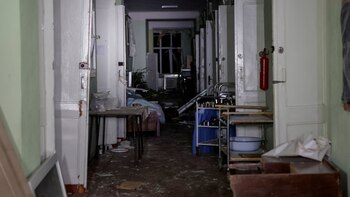
Born in Barnaul, Russia, Darja Varfolomeev attended her first rhythmic gymnastics class when she was three years old, as it was the sport her mother had practiced, as do so many girls born in Eastern Europe.
In 2019, she decided to move alone to Germany, her grandfather’s native country, and at the age of 13 she faced the challenge of being away from her parents while continuing her training. The undisputed talent of the little Russian fell into the hands of a great coach, the Belarusian Olympic runner-up in Sydney 2000, Yulia Raskina. Together, they have led Germany to win the first world medal since unification in 2022, and last week to the feat of winning all the individual titles put at stake at the World Championship in Valencia.
In an interview with the official website of the Olympic Games, Varfolomeev recounted those years, not so far away, living with her grandparents in Germany: “At first I moved alone. My mom and dad didn’t come with me. It was very hard the fact that I didn’t know the language and that I was in a completely different country.” Schooling helped in the adaptation process and within two years Varfolomeev was already fluent in the German language.
The gymnast made her international debut in 2022 on the Tashkent date of the World Championship circuit of the International Gymnastics Federation (FIG). Her level immediately attracted attention and the results were eloquent because she won four medals: bronze in the All Around and in the hoop, and silver in the ball and ribbon. She followed up with two bronze medals at the 2022 European Championship, in clubs and ball; and four podiums in her World Championship debut, including the runner-up All Around.
Varfolomeev’s perfect record in Valencia is enough to leave a lasting legacy in rhythmic gymnastics. To her outstanding technical level, she added the temperance to do her last series of the final All Around with a calm and consistency that is difficult to explain, considering her young career: “I think people will remember that I am very strong mentally despite being only 16 years old,” the German answered when asked how she would like to be remembered. “I always try to stay calm. I’m not afraid because I know that we spend a lot of time training,” she added.
Last week in Valencia, Varfolomeev won her first two gold medals on the opening day, with her ring series, in which she plays a spy, and with her ball series, in which she tells the story of a desperate lover. Then came the world titles in clubs, with a box office routine to the rhythm of Alex Gaudino’s “Destination Calabria”, and the ribbon title, with her most personal series. In this complex six-meter-long device with the disturbing rhythms of Generali de Havasi, it seems to take spectators to a mystical land while, in reality, it retells the story of Varfolomeev as a gymnast. “In my ribbon routine, I have selected quite heavy and strong music to describe my journey to rhythmic gymnastics,” confessed Varfolomeev, who enjoys listening to music and painting numbers as an activity to calm anxiety.
The fifth came on the last day of individual competition, with the most important medal: the all-around medal, which had her escort the Italian Sofia Raffaelii to the third rotation. In her last pass, Varfolomeev made an impact with her performance with the ball to move to the front and finish the tournament visibly excited.

The Olympic square in Varfolomeev is almost a fact. She secured her country’s place in the World Championship last year and last week in Valencia, her compatriot Margarita Kolosov secured the second ticket to Paris 2024. It’s hard to imagine that the five-time world champion isn’t one of the two gymnasts that Germany appoints to fill those places.
“It’s always important to improve. The Olympic Games are the most important competition for every athlete. I would say that right now I am at approximately 70 percent, so there is room to reach 100 percent between now and next year,” said Varfolomeev, whom rhythmic gymnastics fans are already dreaming of seeing her at the Arena Porte de la Chapelle, next summer in Paris.
Últimas Noticias
Sinner-Alcaraz, the duel that came to succeed the three phenomenons
Beyond the final result, Roland Garros left the feeling that the Italian and the Spaniard will shape the great duel that came to help us through the duel for the end of the Federer-Nadal-Djokovic era.
Table tennis: Brazil’s Bruna Costa Alexandre will be Olympic and Paralympic in Paris 2024
She is the third in her sport and the seventh athlete to achieve it in the same edition; in Santiago 2023 she was the first athlete with disabilities to compete at the Pan American level and won a medal.

Rugby 7s: the best player of 2023 would only play the medal match in Paris
Argentinian Rodrigo Isgró received a five-game suspension for an indiscipline in the circuit’s decisive clash that would exclude him until the final or the bronze match; the Federation will seek to make the appeal successful.

Rhonex Kipruto, owner of the world record for the 10000 meters on the road, was suspended for six years
The Kenyan received the maximum sanction for irregularities in his biological passport and the Court considered that he was part of a system of “deliberate and sophisticated doping” to improve his performance. He will lose his record and the bronze medal at the Doha World Cup.

Katie Ledecky spoke about doping Chinese swimmers: “It’s difficult to go to Paris knowing that we’re going to compete with some of these athletes”
The American, a seven-time Olympic champion, referred to the case of the 23 positive controls before the Tokyo Games that were announced a few weeks ago and shook the swimming world. “I think our faith in some of the systems is at an all-time low,” he said.




